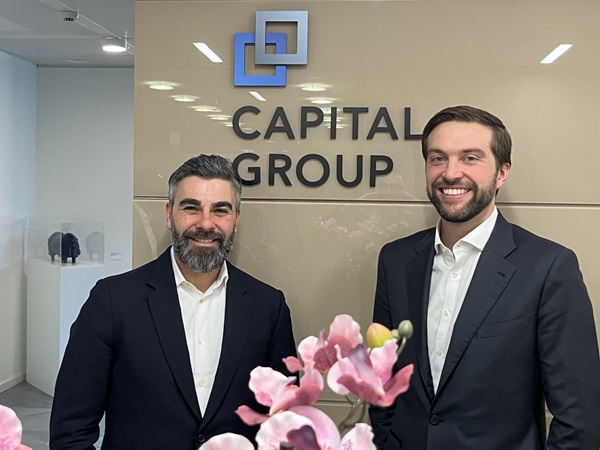 (L-R) Flavio Carpenzano, Christophe Braun, Capital Group;
Credit: Chronicle.lu
(L-R) Flavio Carpenzano, Christophe Braun, Capital Group;
Credit: Chronicle.lu
On Tuesday 16 January 2024, Capital Group held an Outlook event for 2024 at its offices in Luxembourg-Kirchberg with two directors presenting their views on investment strategies going forward.
Christophe Braun, Equity Investment Director, and Flavio Carpenzano, Fixed Income Investment Director, reviewed the larger trends and events that may shape the coming year and further ahead, stressing Capital Group's long-term perspective across asset classes and geographies.
As we enter 2024, the investment context seems to be characterised by a new 'era' of higher rates, opening a window of opportunity for moving cash off the sidelines and active investing through election uncertainty. While rolling recessions may limit the likelihood of broad downturn, a rebound of earnings could lift equity markets.
Flavio Carpenzano shared his views on compelling income opportunities across corporate bonds and high yield, and how high starting yields, better fundamentals and falling rates should support EM debt in 2024 and beyond. He reflected on 2023 to help see what can happen in 2024. The volatility of markets was higher than in 2008, driven primarily by high rates. Looking forwards, this volatility is here to stay, at least in the short term as banks become more data dependent. Long-term, he sees a downward path regarding inflation. Re fixed income results, between 85% - 100% of returns were driven in just two months at the end of the year, reflecting the importance of staying invested. Cash is become less and less attractive, more and more risky. The question for 2024 is how much rates will be cut which will have strong impact on markets. Pre-inflation, the markets were easier to read; now outcomes are becoming more and more binary. Looking back, 2023 was the most-telegraphed recession. Diversification is very important in fixed income, balanced between different asset classes. He confirmed that the opportunities for fixed income are still there. He also explained that if central banks reduce interest rates, it would not be due to recession, it would be due to "maintenance".
Christophe Braun examined how investors can separate the hype from real opportunity. He addressed the equity perspective. Taking a long-term view, nobody has a crystal ball; he stressed the importance of having different scenarios. Equities take a bottom-up approach and think of companies first, seeing how they can succeed in a macro environment. He said that they look at theme, e.g. AI, healthcare. He referred to a "rolling recession" which is where specific sectors are affected. For example, the travel industry was badly affected in 2020; housing, semiconductors, etc., are all affected differently. 2023 was a year of two extremes: high interest rates made many investors jump ship while other investors saw the attractiveness of interest rates rising. The risk adverse need an opportunity to get back into the market. The "magnificent seven" global stocks (Meta, Tesla, etc.) has due to a hype in AI in a narrow-driven market. He also said that the large expenditure bill signed off by US President Biden in 2021 is now reaping dividends with higher manufacturing output a direct result.
Looking at the upcoming US Presidential election, CR said that Wall Street and the markets will unlikely be affected differently depending on who is elected. Flavio Carpenzano stated that if Trump wins, then interest rates are likely to fall; if Biden wins then fiscal spending is likely to be retained. He stressed that this is not unique to the US, it is common through the developed world.
On the issue of specific sectors to look out for, Christophe Braun stressed that it is crucial to separate hype from reality, by seeing which companies will dominate. Regarding AI, he stressed that the related aspects will be interesting to follow, i.e. AI applications, e.g. whether it would be in the fast food industry, pharma, etc. Flavio Carpenzano talked about the macro perspective and resilient growth.
Christophe Braun also explained that the Capital Group normally start with companies with lower yields
Bérenger Vidal de la Blache, Managing Director for Luxembourg, Belgium and France, explained that Capital Group is headquartered in Los Angeles - where it was founded in 1931 - with offices in Geneva and London and has 40 staff based in Luxembourg, amongst other European offices, where it is undertakes fund management and related activities. It also has a significant present in Asia. It is the world's largest manager of mutual funds. The group opened its first fund in Luxembourg over 50 years ago.








